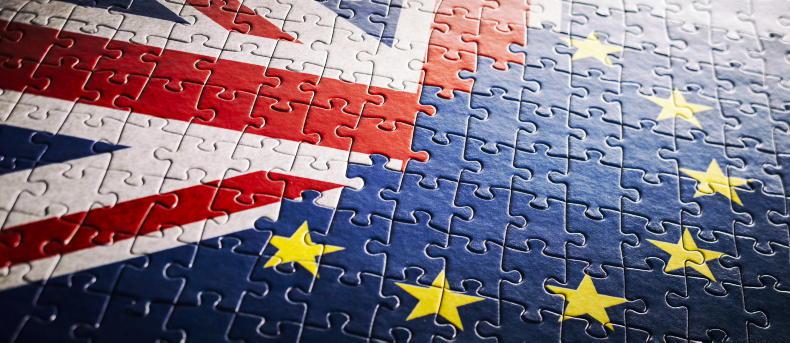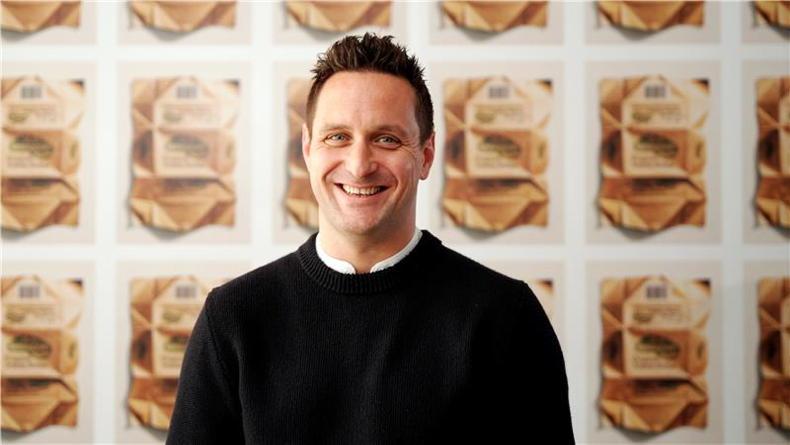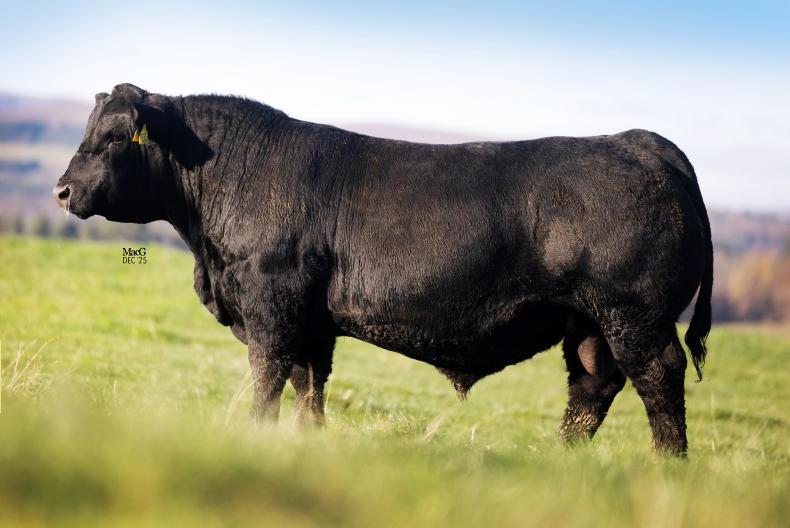With relative political stability restored to the UK and a draconian mix of tax increases and spending cuts to tackle the black hole in the budget, thoughts are again turning to the nature of the relationship with the EU.
This is driven by a growing realisation that as the economy slips into recession, UK economic growth is estimated to be approximately £88bn (€100bn) lower than it would have been if the UK was still part of the EU.
This figure was last updated on 26 May this year by the government’s own Office for Budget Responsibility (OBR).
To put this figure in context, the government’s assessment of the value of the trade deal with Australia is an increase in GDP of less than 0.1%
The key side effect of this deal for Irish farmers is the open-door access that Australia will have to the UK market for beef and lamb built up over a 15-year period.
This was highlighted recently by the previous UK minister responsible for agriculture George Eustice who said that “the UK gave away far too much for far too little in return” and that as he was no longer a minister, he “no longer has to put such a positive gloss on what was agreed.”
The deal was approved by the Australian parliament this week but is still going through the process in the UK.
Much has been said about the improved mood in the relationship between the UK and EU under the new prime minister Rishi Sunak.
However, trade deals aren’t designed by mood music but dull line by line negotiation.
The reality is that the UK–EU trade deal was concluded essentially on EU terms once the UK made it clear that it was no longer interested in the conditions that came with either participating in the single market or customs union.
What the EU hadn’t factored in was the UK unilaterally rewriting the protocol part of the agreement which was designed to manage Brexit for Northern Ireland and maintain its participation in the EU single market.
The most straightforward solution for removing the checks on goods entering Northern Ireland from the rest of the UK would be the UK government re-joining the single market in the same way that Norway participates in it, though not a member of the EU.
However, this is politically difficult as it means accepting the freedom of movement for goods, capital, people and services as well as making a contribution to the EU budget. Immigration is a redline issue for the UK so this is unlikely. A veterinary agreement would also solve many of the issues but this too isn’t acceptable to the UK at this point.
External tariffs
The UK returning to the customs union is made difficult if not impossible by the UK trade agreements with other countries such as Australia and New Zealand.
To be part of the customs union means alignment of external tariffs with the EU and this will no longer be possible parallel to the UK trade agreements with Australia and New Zealand coming into effect.
Both the current Government and the Labour party have ruled out any return to EU institutions during this or the next parliament.
The ideal that the UK might adopt what was described as the Switzerland model of trade relationship with the EU was floated over last weekend though rejected this week by the UK government.
In reality, the Switzerland model is numerous bilateral treaties with the EU and it is cumbersome and often a cause of friction between both parties.
The challenge is to find a way that allows it to participate fully in the UK single market at the same time without compromising the EU single market in the process
It isn’t something that the EU would particularly welcome being extended to another country as EU deals have to be ratified by all 27 member states.
However, given the impasse that has been reached on the protocol, there may be merit in the UK and EU exploring if they could develop bespoke arrangements that do not neatly fit within any particular model.
In relation to managing the land border between the EU and UK on the island of Ireland, the preferred option is to have Northern Ireland participating in the EU single market.
The challenge is to find a way that allows it to participate fully in the UK single market at the same time without compromising the EU single market in the process.
This would require the EU diluting its redline to some extent on border controls but, realistically, there is no option short of excluding Northern Ireland from the EU single market.
The EU found out that while it may have negotiated what it wanted in the Brexit withdrawal agreement and protocol, it meant little when dependent on the UK to enforce it.
Necessity encourages pragmatism
If the UK and EU cannot find a solution to the protocol, then the entire trade deal becomes vulnerable.
As the EU–US trade spat around Boeing and Airbus illustrated, selective penalty tariffs are imposed by one of the aggrieved parties followed by retaliatory tariffs.
These are extremely political and are targeted where pain will be experienced by senior political figures or where there is a vulnerability.
Nothing is more vulnerable in such a scenario as Irish beef and cheddar sales to the UK, which would be liable to in excess of €1bn of tariffs if full tariffs were applied.
However, the better mood music between the UK and EU under the current prime minister, coupled with the severe difficulties in the UK economy suggests that there is little desire for making the trade position worse as it would be if selective tariffs were introduced in a dispute.
Getting a workable solution to managing the single markets on the island of Ireland in the form of a rebranded protocol is the key that can begin to unlock a series of arrangements to free up non-tariff barriers to trade between the UK and wider EU.
If these can be done in bitesized pieces by this UK government and its successor, a situation could be arrived at where the UK would have a series of bilateral agreements with the EU in much the same way that Switzerland currently has though it could never be described as a Swiss-style model.
Until there is a settled post-Brexit relationship between the EU and UK, Irish beef and cheddar remain exposed to a potential €1bn tariff bill and inevitable fall out on farmers.
While this risk remains theoretical with a general view that it would never come to pass, it is easy to be complacent.
The first direct experience of what Brexit feels like for the UK electorate was when it discovered roaming charges again in 2022 on their continental holidays.
So far, Irish farmers have had no real consequences from Brexit but until the protocol is solved and the TCA is on a sound footing, the risk remains.
EU-UK trade spat could cost Irish farmers €1bn.UK could participate in single market, but UK Labour Party, as well as government, has ruled out a return to single market or customs union.Customs union not an option with UK trade deals.UK government estimates Brexit cost of 4% to economy.Australian trade deal to increase UK GDP by 0.08%.Former UK agriculture minister ridicules UK-Australia deal.
With relative political stability restored to the UK and a draconian mix of tax increases and spending cuts to tackle the black hole in the budget, thoughts are again turning to the nature of the relationship with the EU.
This is driven by a growing realisation that as the economy slips into recession, UK economic growth is estimated to be approximately £88bn (€100bn) lower than it would have been if the UK was still part of the EU.
This figure was last updated on 26 May this year by the government’s own Office for Budget Responsibility (OBR).
To put this figure in context, the government’s assessment of the value of the trade deal with Australia is an increase in GDP of less than 0.1%
The key side effect of this deal for Irish farmers is the open-door access that Australia will have to the UK market for beef and lamb built up over a 15-year period.
This was highlighted recently by the previous UK minister responsible for agriculture George Eustice who said that “the UK gave away far too much for far too little in return” and that as he was no longer a minister, he “no longer has to put such a positive gloss on what was agreed.”
The deal was approved by the Australian parliament this week but is still going through the process in the UK.
Much has been said about the improved mood in the relationship between the UK and EU under the new prime minister Rishi Sunak.
However, trade deals aren’t designed by mood music but dull line by line negotiation.
The reality is that the UK–EU trade deal was concluded essentially on EU terms once the UK made it clear that it was no longer interested in the conditions that came with either participating in the single market or customs union.
What the EU hadn’t factored in was the UK unilaterally rewriting the protocol part of the agreement which was designed to manage Brexit for Northern Ireland and maintain its participation in the EU single market.
The most straightforward solution for removing the checks on goods entering Northern Ireland from the rest of the UK would be the UK government re-joining the single market in the same way that Norway participates in it, though not a member of the EU.
However, this is politically difficult as it means accepting the freedom of movement for goods, capital, people and services as well as making a contribution to the EU budget. Immigration is a redline issue for the UK so this is unlikely. A veterinary agreement would also solve many of the issues but this too isn’t acceptable to the UK at this point.
External tariffs
The UK returning to the customs union is made difficult if not impossible by the UK trade agreements with other countries such as Australia and New Zealand.
To be part of the customs union means alignment of external tariffs with the EU and this will no longer be possible parallel to the UK trade agreements with Australia and New Zealand coming into effect.
Both the current Government and the Labour party have ruled out any return to EU institutions during this or the next parliament.
The ideal that the UK might adopt what was described as the Switzerland model of trade relationship with the EU was floated over last weekend though rejected this week by the UK government.
In reality, the Switzerland model is numerous bilateral treaties with the EU and it is cumbersome and often a cause of friction between both parties.
The challenge is to find a way that allows it to participate fully in the UK single market at the same time without compromising the EU single market in the process
It isn’t something that the EU would particularly welcome being extended to another country as EU deals have to be ratified by all 27 member states.
However, given the impasse that has been reached on the protocol, there may be merit in the UK and EU exploring if they could develop bespoke arrangements that do not neatly fit within any particular model.
In relation to managing the land border between the EU and UK on the island of Ireland, the preferred option is to have Northern Ireland participating in the EU single market.
The challenge is to find a way that allows it to participate fully in the UK single market at the same time without compromising the EU single market in the process.
This would require the EU diluting its redline to some extent on border controls but, realistically, there is no option short of excluding Northern Ireland from the EU single market.
The EU found out that while it may have negotiated what it wanted in the Brexit withdrawal agreement and protocol, it meant little when dependent on the UK to enforce it.
Necessity encourages pragmatism
If the UK and EU cannot find a solution to the protocol, then the entire trade deal becomes vulnerable.
As the EU–US trade spat around Boeing and Airbus illustrated, selective penalty tariffs are imposed by one of the aggrieved parties followed by retaliatory tariffs.
These are extremely political and are targeted where pain will be experienced by senior political figures or where there is a vulnerability.
Nothing is more vulnerable in such a scenario as Irish beef and cheddar sales to the UK, which would be liable to in excess of €1bn of tariffs if full tariffs were applied.
However, the better mood music between the UK and EU under the current prime minister, coupled with the severe difficulties in the UK economy suggests that there is little desire for making the trade position worse as it would be if selective tariffs were introduced in a dispute.
Getting a workable solution to managing the single markets on the island of Ireland in the form of a rebranded protocol is the key that can begin to unlock a series of arrangements to free up non-tariff barriers to trade between the UK and wider EU.
If these can be done in bitesized pieces by this UK government and its successor, a situation could be arrived at where the UK would have a series of bilateral agreements with the EU in much the same way that Switzerland currently has though it could never be described as a Swiss-style model.
Until there is a settled post-Brexit relationship between the EU and UK, Irish beef and cheddar remain exposed to a potential €1bn tariff bill and inevitable fall out on farmers.
While this risk remains theoretical with a general view that it would never come to pass, it is easy to be complacent.
The first direct experience of what Brexit feels like for the UK electorate was when it discovered roaming charges again in 2022 on their continental holidays.
So far, Irish farmers have had no real consequences from Brexit but until the protocol is solved and the TCA is on a sound footing, the risk remains.
EU-UK trade spat could cost Irish farmers €1bn.UK could participate in single market, but UK Labour Party, as well as government, has ruled out a return to single market or customs union.Customs union not an option with UK trade deals.UK government estimates Brexit cost of 4% to economy.Australian trade deal to increase UK GDP by 0.08%.Former UK agriculture minister ridicules UK-Australia deal. 








SHARING OPTIONS